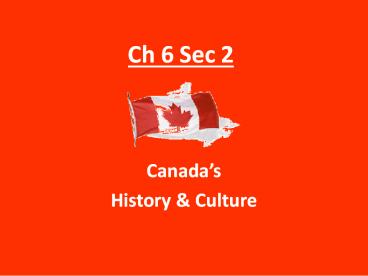Ch 6 Sec 2 - PowerPoint PPT Presentation
1 / 31
Title:
Ch 6 Sec 2
Description:
Ch 6 Sec 2 Canada s History & Culture Charles VII of France George V of England In 1921, King George V proclaimed the official colours of Canada as red, from the ... – PowerPoint PPT presentation
Number of Views:73
Avg rating:3.0/5.0
Title: Ch 6 Sec 2
1
Ch 6 Sec 2
- Canadas
- History Culture
2
Saint George's Cross
George V of England
Charles VII of France
In 1921, King George V proclaimed the official
colours of Canada as red, from the Saint George's
Cross, and white, from the French royal emblem
since King Charles VII. As early as 1700, the
maple leaf began to serve as a symbol celebrating
Canada's nature and environment. The maple leaf
on the flag is a sugar maple leaf. Sugar maples
are native to Canada and have brilliant fall
foliage. The number of points on the leaf has no
significance. The Maple Leaf Flag has been used
officially since its adoption in 1965.
3
(No Transcript)
4
Canada
A. Maritime Provinces
B. Prairie Provinces
C. Toronto
D. Montreal
E. Vancouver
F. Edmonton
G. Nunavut
5
History and Government
Canada's Parliament Buildings
6
- Canadas history has been influenced by its
French English roots, a drive for independence,
by immigration. - Canadas history has been shaped by
- Great Britain France feuding over land
government - The U.S. possibly gaining their land
- Native American cultures
- Immigrants from around the world
- Canada became a self-governing dominion in 1867
while retaining ties to the British crown
7
Jacques Cartier (1491-1557)
8
French Explorer
9
John CabotBritish Explorer
Cabot Tower in St. John's, Newfoundland
10
(No Transcript)
11
- Britain France fought wars over the Canada
territory - Britain won the wars, in 1774 under the Quebec
Act, Britain gave French settlers the right to
maintain their own language, religion laws.
12
(No Transcript)
13
Population Patterns
- Canada has a diverse mixture of ethnic groups,
densely populated urban areas, vast expanses of
rugged terrain.
14
- Immigrants came to Canada for the following
reasons - Search for political religious freedom
- Economic educational opportunities
- Refuge from different wars
15
Canadas CapitalOttawa
16
Prime Minister ofCanada is Justin Trudeau
Queen Elizabeth Of Britain
17
Canada's Parliament Buildings
18
Library of Parliament
19
Peace Tower
20
Ottawas canals
21
(No Transcript)
22
- Most of Canadas population lives in urban areas
Toronto, Montreal, Vancouver, Edmonton
23
- Most of Canadas population lives along the U.S.
Canadian border - Toronto, with a population of 2.48 million is
Canadas largest city - Toronto is the third-largest production center in
the English speaking world - Since World War II, there has been growth in
manufacturing, mining, service industries.
24
- Modern challenges
- Immigration, increased crime
- NAFTA has eliminated trade barriers, with the
U.S, the effect is free trade. - French-speaking Canadians desire for
independence (separatism) from the rest of Canada
http//video.nationalgeographic.com/video/player/p
laces/regions-places/us-canada-and-mexico/canada_c
anadianrainforest.html
25
Culture
- European, Asian, Native American cultures have
influenced Canadas cultural diversity.
26
Yukon Territory
27
- Language- two official languages, English
French. - Religion- Christians are the largest group
- Education- public private schools are available
- Health care- the Canadian government helps pay
for health care.
28
- The Arts- British, French, American, and Native
cultures have influenced the arts. - Family life- Canada is one of the wealthiest
countries in the world, so many families enjoy a
high standard of living. Canadians have a 97
literacy rate.
29
The End!!!
http//us.canada.travel/videos/index.php
30
(No Transcript)
31
(No Transcript)































